Stale Food, Naked Body And Torn Tents Over Head
By Ruman Sutradhar & Debasish Dey
20 February, 2015
Countercurrents.org
As a part of daily routine, I was on my way to university when my eyes got stuck on the view of two kids, both naked, playing on the road side. Although it was not unusual to see painful sights as such on the way, but the way one child was trying to wipe the tears of the other younger (2 years) was something that made me to think deeper. Actually they were the ones who came from a village of West Bengal as refugees. Every year they would come to Silchar (main town of Cachar) to earn money by selling jari butis since they belonged to the Bedi community, one who gives ayurvedic medicines and was called in ancient India as byad.
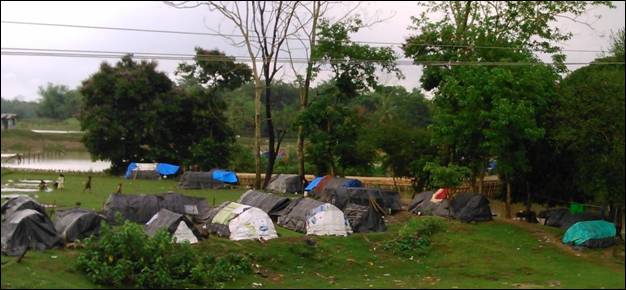
Tents of the migrant refugees
To live the life of a refugee means to live a pathetic life exposed to varied forms of ill treatment, but to be a woman refugee means to get exposed to not only the ill treatments of society but also to that within their own community. The sight of those roadside kids made me to meet the community following which I got down near those tents. Moving across the passage over drain we reached the tents to find only the young girls and little kids, where the girls were very well carrying out their responsibilities for being ‘girls'.
Right from the time these girls can walk properly they begin to carry out their duties of taking care of the younger siblings, mothers being outside for work. Even the first kid whom I saw in the road side was a little girl only, carrying her younger brother. At an age when their hands should hold the pencils and games, they are made to hold a child and sometimes the brooms and utensils. Their life is no different from the life of a Dalit girl whose mother goes out for work. Entire year these Muslim refugees would wander from place to place in order to earn money finding no option to feed stomach at their native places. This life could hardly provide the kids with chances to get admitted to a school, and schooling from the hometown was barred either by their extreme level of poverty or by the illiterate parent's unawareness. Although some couple kept their kids at hometown which could somehow provide them with the chances to get education at least up to the primary level, but that again were the boy child, as because girls could not be kept alone at home. In either way girls do not get any chance to learn even the basic alphabets, and as is known well, lack of education degenerate humans to live like animals. This was put very nicely by Savitribai Phule (1854)-
“If you have no knowledge, have no education,
And you yearn not for the same,
You posses intellect but work not on the same,
How then can you be called a human being?
...
Birds, animals, monkeys, human beings too,
All go through life and death,
But if you gain no knowledge about this,
How then can you be called a human being?”
Attainment of 12 years means time to get the girl married. Early marriage among the Bedis is basically due to two reasons; one is that, their chastity would be preserved as per the patriarchal norms by preventing their mind to even think of choosing a life partner of their own; the other is that as soon as a girl is married, her parents would get some money from the groom's family which is a good opportunity for the poor parents to have some relief from poverty. The girl thus have no other reason than to smile over the commodification of her physical being by her own parents, as her marriage is nothing but to sell her chaste body to a man within the community.
After marriage girl's duty begins when they have to serve husband as well as their own stomach for it was then they would go out to work. As to the work, women are not confined to their homes. But as per the traditional norms, the women has to complete her duty of cooking, fetching water, washing clothes and all the household works before they go out to work despite the fact that their work was more difficult compared to the men. Although both the sexes sells the traditional jari butis, roots, stones but there are differences because the men would sit somewhere in the town displaying the medicinal things and the women, in contrast, walk through the city, person to person, house to house, to sell the things. Apart from this they also claim to cure diseases as called in their words ‘dater puka jharano, pete betha sarano' (removing insects from teeth, curing stomach pain) and such others. Returning home at dusk, they continue to do their household, while the tired men would take rest till next day morning.
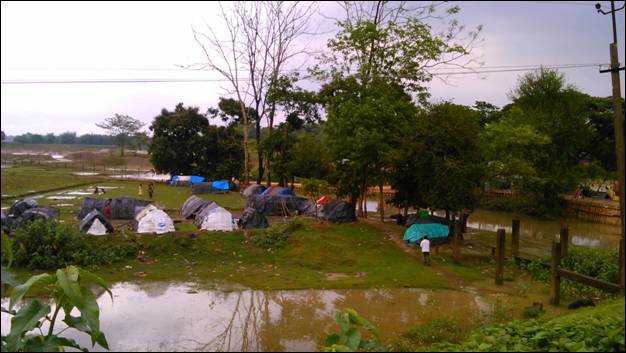
Passage over the drain water

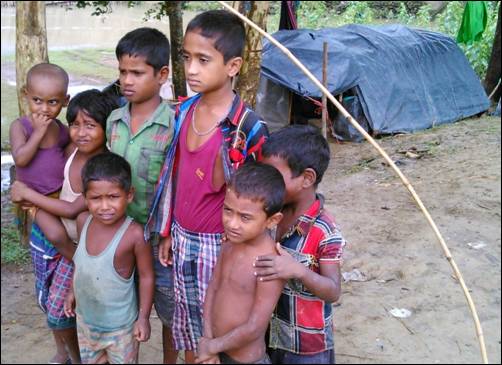
Duty of an elder sister begins at the age of 6
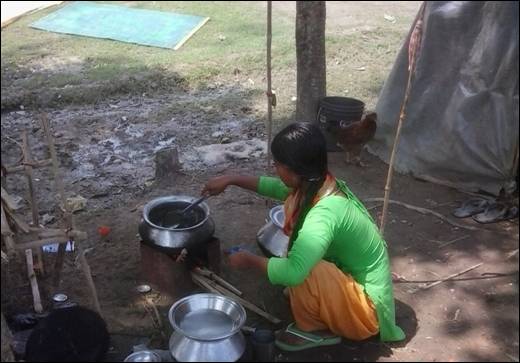
A 13 year married girl cooking food
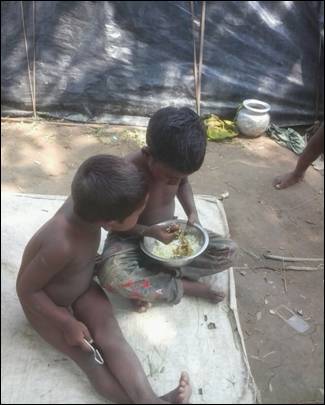
Children eating food
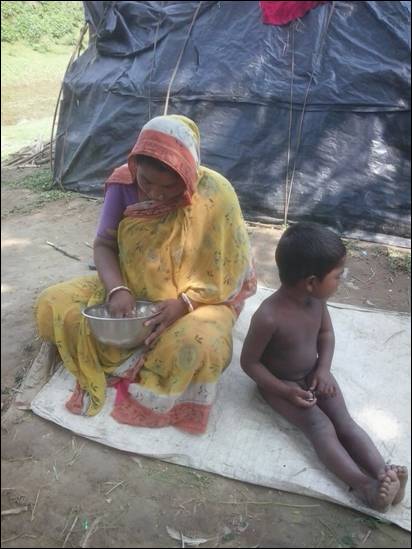
A 45 year refugee woman with her grand son
Photo Courtesy: Ruman Sutradhar and Debasish Dey
Author's Bio:
*Ruman Sutradhar is a Research scholar with Assam University. Her areas of research interest include gender studies, marginalized groups and Dalit studies. She can be reached at Email- [email protected]
**Debasish Dey is a Research Scholar with Assam University. His areas of research interest include ethno-Archaeology, marine Archaeology and ancient Indian history. He can be reached at Email- [email protected]
.
Comments are moderated

